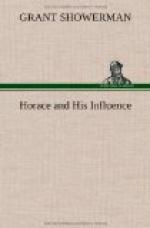The motto of Warren Hastings was Mens aequa in arduis,—An even temper in times of trial. Even humorous use of these phrases has served a purpose. The French minister, compelled to resign, no doubt drew substantial consolation from Virtute me involvo, when he turned it to fit his case:
I_n the robe of my virtue I wrap me round_
A solace for loss of all
I had;
B_ut ah! I realize I’ve found_
W_hat it really means to be
lightly clad_!
But the most pronounced effect of Horace’s dynamic power is its inspiration to sane and truthful living. Life seems a simple thing, yet there are many who miss the paths of happiness and wander in wretched discontent because they are not bred to distinguish between the false and the real. We have seen the lesson of Horace: that happiness is not from without, but from within; that it is not abundance that makes riches, but attitude; that the acceptation of worldly standards of getting and having means the life of the slave; that the fraction is better increased by division of the denominator than by multiplying the numerator; that unbought riches are better possessions than those the world displays as the prizes most worthy of striving for. No poet is so full of inspiration as Horace for those who have glimpsed these simple and easy yet little known secrets of living. Men of twenty centuries have been less dependent on the hard-won goods of this world because of him, and lived fuller and richer lives. Surely, to give our young people this attractive example of sane solution of the problem of happy living is to leaven the individual life and the life of the social mass.
IV. CONCLUSION
We have visualized the person of Horace and made his acquaintance. We have seen in his character and in the character of his times the sources of his greatness as a poet. We have seen in him the interpreter of his own times and the interpreter of the human heart in all times. We have traced the course of his influence through the ages as both man and poet. We have seen in him not only the interpreter of life, but a dynamic power that makes for the love of men, for righteousness, and for happier living. We have seen in him an example of the word made flesh. “He has forged a link of union,” writes Tyrrell, “between intellects so diverse as those of Dante, Montaigne, Bossuet, La Fontaine, Voltaire, Hooker, Chesterfield, Gibbon, Wordsworth, Thackeray.”
To know Horace is to enter into a great communion of twenty centuries,—the communion of taste, the communion of charity, the communion of sane and kindly wisdom, the communion of the genuine, the communion of righteousness, the communion of urbanity and of friendly affection.
“Farewell, dear Horace; farewell, thou wise and kindly heathen; of mortals the most human, the friend of my friends and of so many generations of men.”




